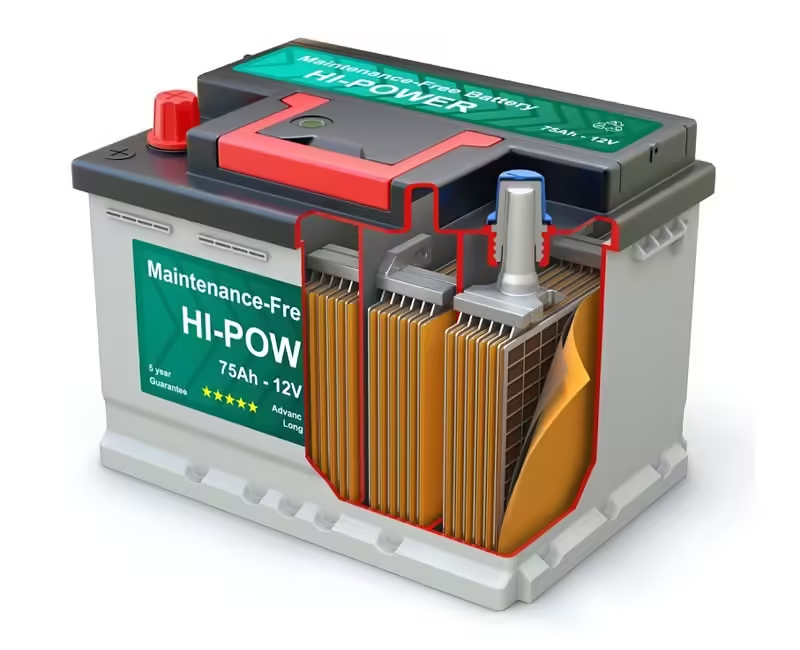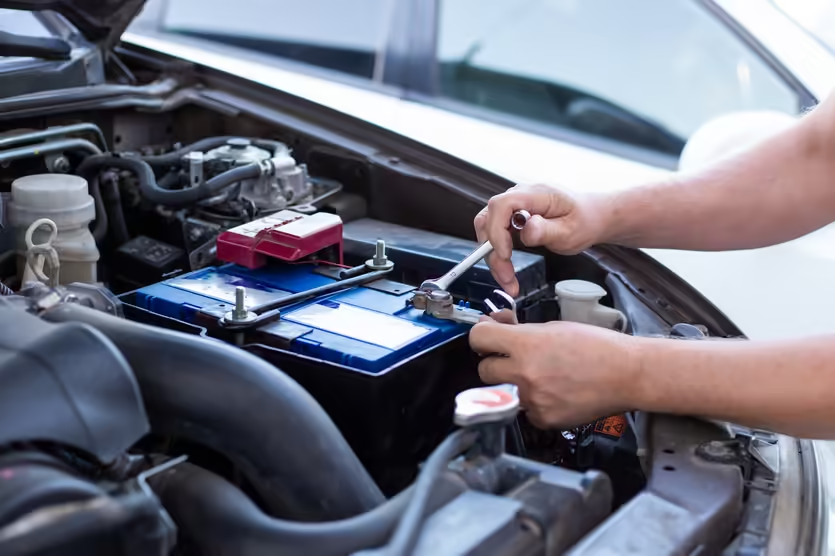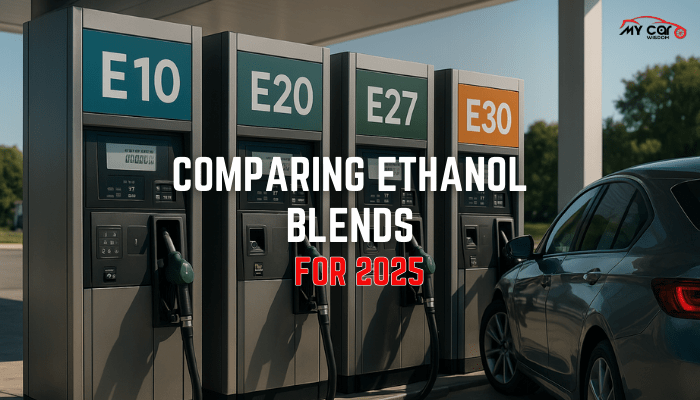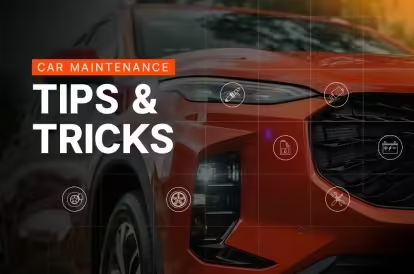Car batteries are a crucial part of any vehicle, whether you’re driving a simple manual car, a luxurious Mercedes G Wagon, or an SUV car in India. Understanding how they work, how to maintain them, and when to replace them can save you a lot of hassle on the road. This blog will walk you through the key things you need to know about car batteries.
Different Types of Car Batteries
There are several types of car batteries, each designed to suit different vehicles and driving needs. Here’s a simple breakdown:
1. Lead-Acid Batteries
These are the most common type found in most cars. They’re reliable and affordable, making them a popular choice for a wide range of vehicles, including everyday sedans and SUVs. Lead-acid batteries come in two forms: Flooded Lead-Acid (FLA), which require regular maintenance, and Sealed Lead-Acid (SLA), which are maintenance-free.

2. AGM (Absorbent Glass Mat) Batteries
These are more advanced than standard lead-acid batteries and are commonly used in modern cars that have higher electrical demands. For instance, if you own a luxury car like a Mercedes or a high-performance SUV, you might have an AGM battery. They are spill-proof, last longer, and handle more starts and stops compared to regular batteries.

3. Lithium-Ion Batteries
These are primarily used in electric vehicles (EVs) and hybrids. Lithium-ion batteries are known for being lightweight and having a high energy density, which means they can store a lot of power in a small space. However, they are more expensive than other types.

4 . Enhanced Flooded Batteries (EFB)
These are a step up from traditional lead-acid batteries and are often used in cars with start-stop technology. They offer better performance and longer life but are more costly.

Understanding the different types of car batteries can help you make an informed decision when it’s time to replace your car battery. Whether you’re driving a standard manual car or a top-of-the-line premium car, choosing the right battery is crucial for your vehicle’s performance.
How Long Do Car Batteries Last?
Car batteries don’t last forever, but how long they last depends on several factors:
- Climate: Batteries tend to have a shorter lifespan in extreme temperatures. Hot weather can cause the battery fluid to evaporate, while cold weather can make it harder for the battery to start your car.
- Driving Habits: If you frequently take short trips, your battery might not have enough time to fully charge, which can reduce its lifespan. Conversely, if you drive long distances regularly, your battery may last longer.
- Vehicle Type: The kind of car you drive can also impact battery life. High-performance vehicles, like a Mercedes-Benz automatic or a sports car, often require more powerful batteries that may wear out faster due to the demands placed on them.
- Maintenance: Regular maintenance, like cleaning the battery terminals and ensuring the connections are tight, can extend your battery’s life.
On average, car batteries last between three to five years. However, it’s always a good idea to have your battery checked regularly, especially if it’s more than three years old.
Signs Your Battery Might Be Failing
No one wants to be stuck with a dead battery, so it’s important to know the warning signs.
- Slow Engine Crank: If your engine takes longer than usual to start, it could be a sign that your battery is losing power.
- Dim Lights: Your car’s headlights or interior lights may start to dim if the battery isn’t supplying enough power.
- Electrical Issues: Problems with your car’s electronics, like the radio or power windows, could indicate a weak battery.
- Warning Light: Some cars have a battery warning light on the dashboard. If this light comes on, it’s a clear sign that there’s an issue with your battery or the charging system.
- Swollen Battery Case: If the battery case looks swollen or bloated, it could be due to overheating, which can shorten the battery’s life.
- Old Age: Even if your battery isn’t showing any of the above signs, if it’s more than three years old, it’s a good idea to have it checked or replaced.
Recognising these signs early can help you avoid getting stranded with a dead battery. Regular checks, especially for those driving premium cars or vehicles with high electrical demands like the Mercedes G Wagon, can keep you on the road and out of trouble.
Maintenance Tips for Enhancing Battery Life
Taking care of your car batteries is essential to ensure it lasts as long as possible. Here are some simple maintenance tips:
- Regular Inspection: Look at your battery regularly to check for any signs of corrosion or leakage. Clean the terminals if you see any build-up and make sure the connections are secure.
- Avoid Short Trips: If possible, try to avoid making only short trips. Short drives can prevent your battery from getting fully charged. If you usually take short trips, consider taking a longer drive now and then to keep the battery in good shape.
- Minimise Power Use When Idling: Don’t leave the radio, air conditioning, or other electronics on when your engine is off, as this can drain your battery.
- Store Properly: If you’re not going to use your car for an extended period, disconnect the battery or use a battery maintainer to keep it charged.
- Temperature Control: Extreme temperatures can affect your battery’s performance. If you can, park your car in a garage or a shaded area to help keep the battery at a stable temperature.
For those who own high-end vehicles like the Mercedes-Benz automatic or other premium cars, regular maintenance is even more important. These cars have complex electronic systems that rely heavily on the battery, so keeping it in top condition is crucial.
How to Choose the Right Car Batteries
It’s crucial to be aware of the early warning signs of a failing car batteries to avoid being stranded unexpectedly. One of the most common indicators is a slow engine crank, where your car struggles to start, especially in colder weather. You might also notice that your headlights and interior lights are dimmer than usual, or that your car’s electronic systems, such as the radio or power windows, are not functioning correctly.
If your dashboard displays a battery warning light, it’s a clear signal that something is amiss with your battery or the charging system. Additionally, a swollen or bloated battery case is a sign of overheating, which can lead to premature battery failure. Recognising these symptoms early allows you to take action before your battery completely dies.
Cost Considerations When Buying a Car Batteries
When it comes to purchasing a new car battery, cost is a significant factor that should be carefully considered. While it might be tempting to opt for the cheapest option available, it’s important to remember that not all batteries are created equal. Budget batteries often come with lower capacity, shorter warranties, and may not last as long as higher-quality options. On the other hand, premium batteries, though more expensive upfront, typically offer better performance, longer lifespans, and warranties that can provide peace of mind.
The cost of a car battery can vary widely depending on the type, brand, and the vehicle it’s intended for. For instance, lead-acid batteries are generally more affordable, but if you drive a high-end vehicle like a Mercedes-Benz or a modern SUV car in India with numerous electronic features, you might need an Absorbent Glass Mat (AGM) battery, which can be more costly. Lithium-ion batteries, common in electric and hybrid vehicles, are on the higher end of the price spectrum but offer exceptional durability and efficiency.
It’s also essential to consider the installation costs. Some batteries are easy to install yourself, saving you money on labour, but others, especially those in newer vehicles, might require professional installation. Additionally, investing in a battery with a longer warranty can be a smart move, as it ensures you’re covered if the battery fails prematurely, reducing your long-term expenses.
In summary, while upfront cost is an important factor, it’s crucial to balance this with the overall value a battery provides. Choosing a battery that meets your vehicle’s specific needs and comes from a reputable brand can ultimately offer better performance and reliability, making it a more economical choice in the long run.
Conclusion
Understanding the essentials of car batteries is crucial for maintaining your vehicle’s performance and avoiding unexpected breakdowns. Whether you drive a standard manual car, a premium Mercedes-Benz, or an SUV car in India, knowing the different types of batteries, how long they last, and the signs of a failing battery can keep you prepared.
Regular maintenance, choosing the right battery, and being mindful of the environmental impact can extend the life of your battery and improve your driving experience. By investing in a quality battery and following the tips outlined above, you can ensure that your car runs smoothly and efficiently, providing you with reliable performance on the road. Remember, your car battery is the heart of your vehicle’s electrical system, so take care of it to keep your car—and your journey—going strong.
Why You Should Trust My Car Wisdom for Automotive Advice
Making sure your car has a reliable battery is essential for keeping your vehicle running smoothly and avoiding any unexpected problems on the road. At My Car Wisdom, we’re here to guide you through every aspect of car ownership, from choosing the right battery to understanding how to properly maintain your vehicle. Our website https://mycarwisdom.com/ offers a wealth of information, including in-depth guides, expert reviews, and helpful tips that are tailored to your needs.
If you’re interested in high-performance cars, don’t miss our latest blog post on the BMW M5: A Detailed Car Review of the Flagship Sedan. In this review, we take a close look at the BMW M5’s features, performance, and pricing, giving you all the details you need to know about this luxury sedan. Whether you’re a car enthusiast or just looking for advice on your next vehicle, My Car Wisdom is your go-to source for everything automotive.
Stay informed and make smarter car choices with My Car Wisdom. Visit us today to explore more helpful content and get the knowledge you need to keep your car in top shape.
Raja Yadav, the content writer at My Car Wisdom, brings a unique voice and style to our blog. With a knack for storytelling and a keen eye for detail, Raja ensures that every piece of content is informative, engaging, and easy to understand. His focus is on delivering high-quality articles that cater to both novice car owners and seasoned automotive enthusiasts.




